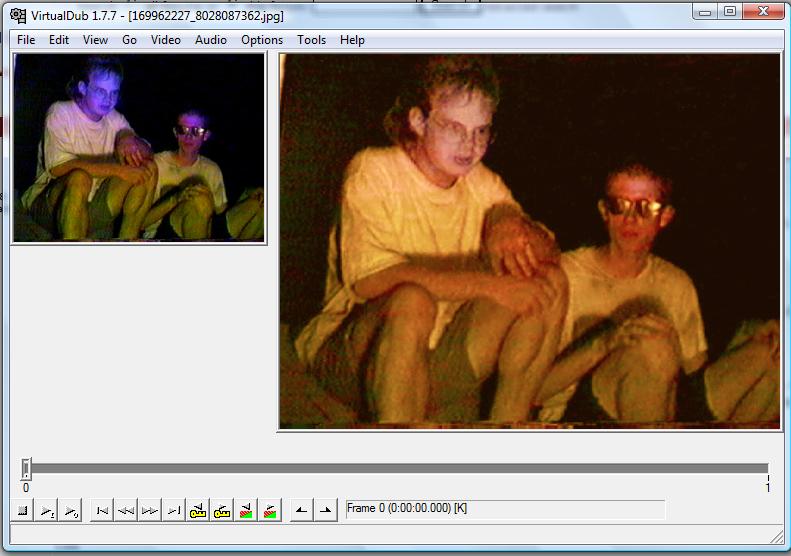I am currently working on a project to convert an independently produced TV series to DVD.
Many of the video tapes have heat damage, and I have no access to the master tapes. They are owned by a library, and do not allow access via those means.
All of my footage is from dubs of those master tapes.
I currently use Sony Vegas Studio and Photoshop CS3 for my video work, but I am completely out of my territory on this one.
Here is a screenshot of the damage I am speaking about. I have also attached it.
Does anyone have any advice on how to attack this?
Any advice would be appreciated!
Thanks,
Lee
+ Reply to Thread
Results 1 to 12 of 12
-
-
I read that post and found it interesting, but it is dealing with problems with the entire frame. Filters and overlays will change the whole frame, which may correct the damage, but then change the rest. This is my conondrum.Originally Posted by themaster1
-
Your title says "Heat Damaged Digital Video". Digital tape fails into pixelation not what you are showing.
Are you talking about VHS or which format?
Also what was the format of the original camcorder master?Recommends: Kiva.org - Loans that change lives.
http://www.kiva.org/about -
The masters were recorded in various formats mainly VHS, 8mm and VHS-C. They are untouchable though, as I said in my original post.
The dubs I have are VHS, but again those tapes are fine, it's the masters with the problem. The only way I can see to really correct this is with some sort of software solution.
I'm looking for some advice here regarding how to fix that damage. -
Looks like this with a bit of ColorMill applied:

But I had to reduce the blue to almost nothing and boost the red to about max. But the 'green legs' aren't much worse.
Also one frame of video is not a good way to judge the result, unless the problem is exactly the same in every frame. But you can definitely improve it. -
So you are dealing with a Y/C to NTSC composite dub captured to YCbCr.
Dub over S-Video would have kept Y and C separate improving the odds for color correction without affecting luminance.
A TBC or frame synchronizer would have improved the original dub. A dub house would have the right equipment.
As it is, you can play with digital filters but don't expect great results.Recommends: Kiva.org - Loans that change lives.
http://www.kiva.org/about -
I do not know exactly how it is dubbed. It's almost like it's a national secret.
I haven't been privey to how they are dubbed, only transferring it from VHS to digital have I been involved. -
If you could dub from the original tapes again, things could be done. Once the stew is over salted*, recovery is difficult and it won't be the same.Originally Posted by llawmaster
* i.e. conversion to composite NTSC.
BTW: Heat didn't destroy that original tape obviously but one side probably got heated more than the other causing warping or stretching on that side of the tape. A playback VCR places even tension on the tape. The stretched portion would show phase (hue) or dropout errors.Recommends: Kiva.org - Loans that change lives.
http://www.kiva.org/about -
Is this for real? TV series are not converted to DVD from second generation VHS dubs!Originally Posted by llawmaster
The library should be paying you (or someone) to do the job properly before the tapes disintegrate further - not locking them away to rot. This is assuming you have copyright permission to do the job.
btw, VHS was never a "master" format - there must be something else - Hi8 at least, even for small TV stations, surely?
Cheers,
David. -
I have seen the masters and they are on VHS (for real).
Anyone can do anything they want with the show, they just cannot make money from it.
This is kind of a passion and not about finances.
Similar Threads
-
Corrupted/damaged video file .avi
By aizen in forum RestorationReplies: 8Last Post: 31st Jan 2012, 14:17 -
Help with damaged avi - audio/video resync
By hibbs in forum EditingReplies: 5Last Post: 16th Jun 2011, 23:20 -
How to fix/edit a damaged video iso?
By hibbs in forum Newbie / General discussionsReplies: 8Last Post: 20th Jul 2010, 17:24 -
Audio Damaged After Video Conversion. How to Fix?
By Fluoresce in forum AudioReplies: 1Last Post: 5th Aug 2008, 04:01 -
How to choose continue video lighting (non-heat style) ?
By AAC in forum Newbie / General discussionsReplies: 0Last Post: 13th Mar 2008, 17:03






 Quote
Quote